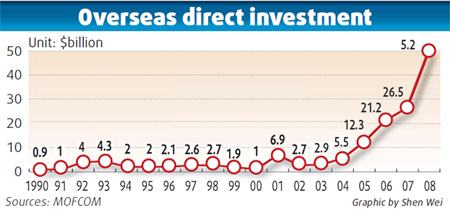
|
BIZCHINA> Top Biz News
 |
|
Looking for ODI success stories
By Ding Qingfen (China Daily)
Updated: 2009-08-03 07:53 In early June, Chinalco confirmed the collapse of the deal to invest $19.5 billion in Australia's Rio Tinto, the world's third-largest mining company. That news did not detract from a positive outlook for ODI prospects through the rest of 2009.
"A number of State-owned and privately owned enterprises are showing a strong willingness to go overseas, and a large number of projects are under negotiation. The second half will be positive for ODI," said Yao Jian, a spokesperson for the Ministry of Commerce. China's foreign exchange regulator, the State Administration of Foreign Exchange, lifted restrictions on ODI activities in mid-June. The agency reported that more financial resources would be available to help Chinese companies finance outbound investments. Earlier, the Ministry of Commerce shortened the approval process for such deals. Those two actions will accelerate outbound investments this year, analysts said. "The growth momentum will be stronger than last year," said Li Jianfeng, an analyst with Shanghai Securities. From 2003 to 2008, China's ODI grew faster than in the previous two decades, and outbound investments from 2007 to 2008 doubled to almost $50 billion. The nature of the investments is changing, too. "Nowadays, obtaining technology and enlarging sales networks are what motivates many investors to go overseas," said Yao of the Ministry of Commerce. Li said the country's growing foreign exchange reserves also are fueling more activity. The "still gloomy economic situation in the United States" is among the reasons China is concerned about the stability of those reserves, he said. China's foreign exchange reserves totaled $2.13 trillion at the end of June, up 17.84 percent year-on-year. "To encourage qualified enterprises to go overseas at this time means to help China relieve the pressure," said Zhang Qizuo, vice-chairman of the China International Economic Research Institute. Still, there has been resistance to some deals. The failure of the Rio Tinto deal in June led analysts to suggest the Australian government was concerned that Chinalco, the world's largest steel producer would manipulate the price of iron ore. Four years ago, the US government said no to a bid by China National Offshore Oil Co to buy Unocal, citing concerns over China's geopolitical influence. On July 23, Beijing Automotive Industry Holding Co (BAIC) was excluded from bidding for General Motor's Opel unit, although the company had made the highest offer. GM reportedly was worried about the possible direct competition launched by BAIC against the other units of its business in China.
Even with successful bids, some observers question whether the buyers have done their homework. "The acquisition of Thomson by TCL and the internationally publicized merger deal for IBM's PC business by Lenovo are examples," said Wu Ziaobo, a senior professor studying Chinese companies at Peking University. "They are all unprofitable and costly businesses, which makes it a difficult task to give them new life," Wu said about IBM and Thomson. Laox lost profits for nine consecutive years before Suning became its largest shareholder. Now analysts are voicing concerns about whether Suning can turn Laox into a success story.

(For more biz stories, please visit Industries)
|
|||||
主站蜘蛛池模板: 久久午夜国产片 | 久久w5ww成w人免费不卡 | 一区二区在线免费视频 | 手机国产日韩高清免费看片 | 真正全免费视频a毛片 | 欧美日韩国产va另类 | 久久亚洲国产伦理 | 亚洲色在线视频 | 久久一区二区精品综合 | 欧美视频一区二区三区在线观看 | 91免费视频版 | 亚洲国产成人九九综合 | 午夜性爽快免费视频播放 | 国产精品1页 | 97视频在线视频 | 精品一区二区三区在线观看l | 欧美成人香蕉网在线观看 | 国产一级片网址 | 日韩亚洲一区中文字幕 | 国产一区二区免费播放 | 18免费网站| 亚洲区精品久久一区二区三区 | 久久99国产亚洲精品 | 日本免费视频观看在线播放 | 亚洲日本在线观看网址 | 亚洲综合无码一区二区 | 国产99高清一区二区 | 国产成人综合日韩精品婷婷九月 | 国产真实乱子伦精品视 | 亚洲精品网址 | 六月丁香久久丫 | 日本免费久久 | 在线播放另类 | 久久极品| 可以免费看黄的网址 | 久久综合精品国产一区二区三区 | 欧美日韩一区二区综合在线视频 | 亚欧视频在线 | 亚洲国产成人私人影院 | 欧美一级高清在线观看 | 国产精品视频第一区二区三区 |